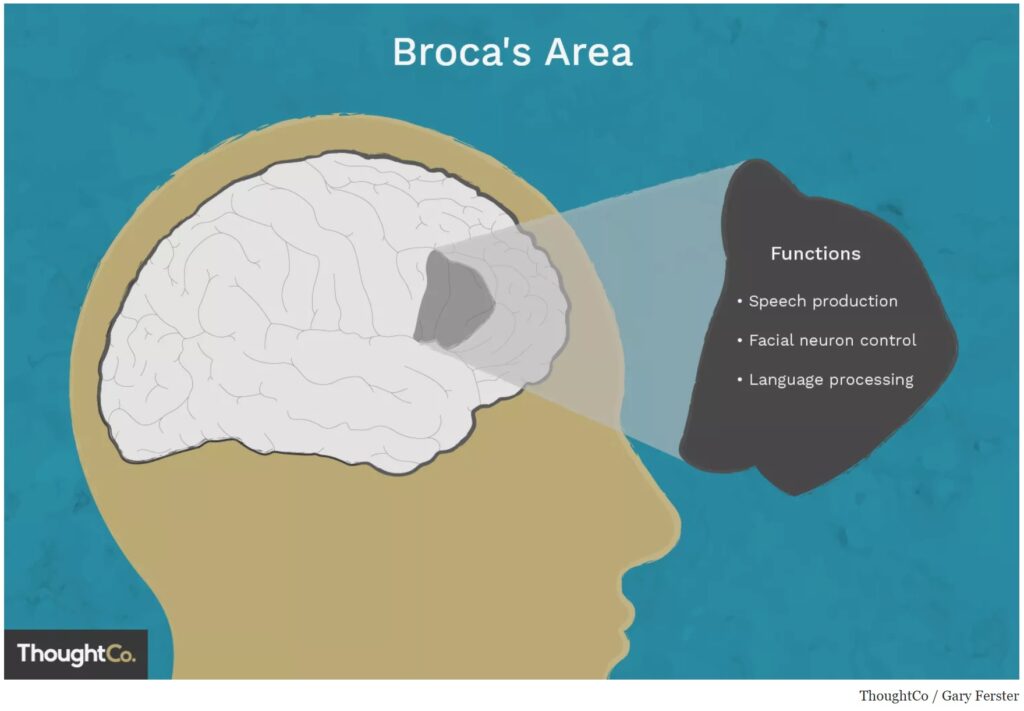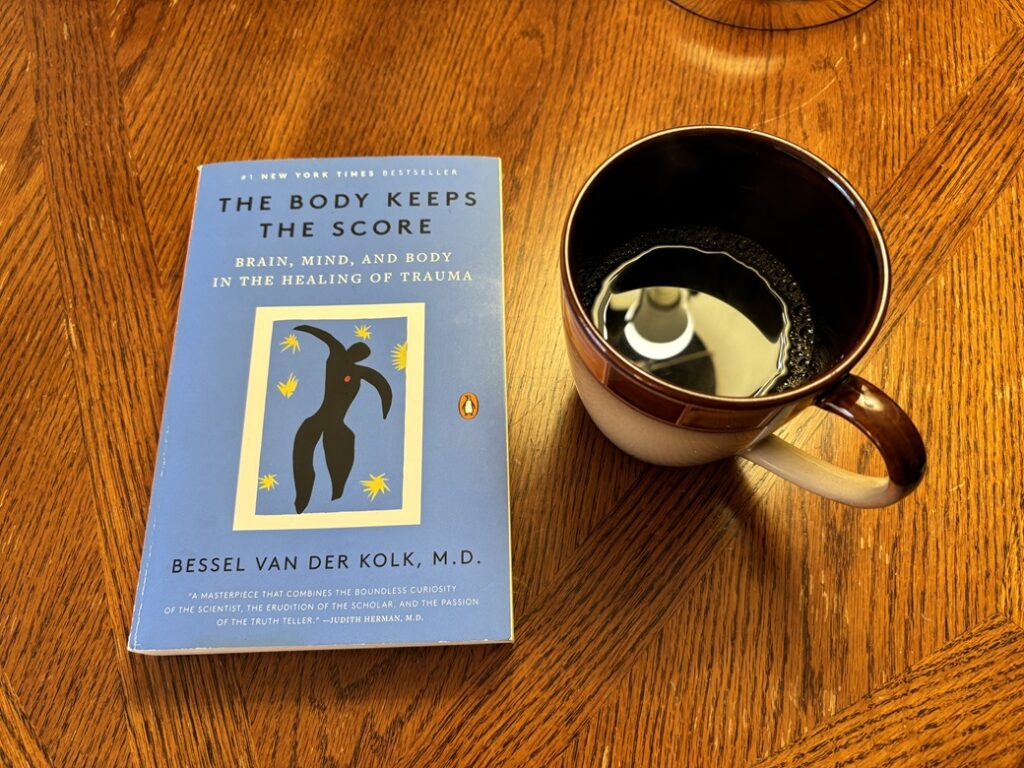COMMENTARY AND SYNOPSIS: The Body Keeps the Score by Bessel Van der Kolk and how trauma damages the ability of people to accept the utter transformation of 12 Step recovery at A.A. meetings. Focusing on a shared history of how trauma damages and victimization alleviates the recovering alcoholics searing sense of isolation, but usually at the price of having to deny their individual differences: Members can belong only if they conform to the common code. The A.A. sub-cult of Primetime may provide solace in sharing how trauma damages, but it does not provide the mental flexibility needed to be fully open to what the complete and utter transformation of recovery has to offer. The meetings alone can not liberate its members from their trauma damages. In Primetime A.A. the goal is to engage the monkey mind in a clever monologue designed for laughs about how trauma damages living in the now moment. The meditations are not silent, they either involve counting or “talking” to God. Conversations With God by Neal David Walsh has had a profound impact on Primetime Alcoholics Anonymous.
Commentary on The Body Keeps the Score by Bessel van der Kolk
1. INTRODUCTION: Childhood Trauma Causes Addiction
2. 12 Steps & 12 Traditions: Damaging Emotional Conflicts
3. Trauma Damages Left Brain Speech
4. BIOFEEDBACK: Meditation on Steroids
5. INTEROCEPTION: Traumatic Awareness
6. What Were You Thinking Right Before You Acted Out Your Childhood Trauma?
7. Communication is the Opposite of Trauma
8. ALEXITHYMIA: Inability to Feel Emotion
9. EMDR Reprocesses Body Awareness and Does Not Visit the Original Trauma in Detail
10. EMDR is for Patients So Traumatized That Full Recovery is Thought to Be Impossible.
11. Lock Down Your Childhood Trauma Instead of Acting it Out
12. Final Healing: The Patient’s Internal Landscape Manifests Critical Mass of Self
13. Eye Movement Desensitizing Reprocessing of Traumatic Memories
3. How trauma damages left brain speech

3. All Trauma is Preverbal
Upon analyzing images of the brain on trauma, one of van der Kolk’s most surprising findings was the loss of function in Broca’s area, one of the speech centers of the brain located on the left side. When stroke patients lose their blood supply to their Broca’s area, they lose the ability to speak. Their left brains are damaged. Without a functioning Broca’s area, you cannot put your thoughts and feelings into words. The left side of the brain is responsible for analytical and reasoning functions. Trauma victims have damaged functioning of their left brains.
When something reminds traumatized people of the past, their right brain reacts as if the traumatic event were happening in the present. But because their left brain is not working very well, they may not be aware that they are reexperiencing and reenacting the past–they are just furious, terrified, enraged, ashamed, or frozen. After the emotional storm passes, they may look for something or somebody to blame for it. They behaved the outrageous way that they did because you were five minutes late, or because you made some minor mistake.
For over a hundred years, every textbook of psychology and psychotherapy has advised that some method of talking about distressing feelings can resolve them. However, trauma treatment now reveals that the experience of trauma itself gets in the way of being able to do that. No matter how much insight and understanding we develop, the rational brain is basically impotent to talk the emotional brain out of its own reality. Van der Kolk is continually impressed by how difficult it is for people who have gone through unspeakable trauma to convey the essence of their experience. It is so much easier for them to talk about what has been done to them–to tell a story of victimization and revenge–than to notice, feel, and put into words the reality of their internal experience. The body keeps the score and not the mind.
Long after the actual traumatic event has passed, the brain may keep sending signals to the body to escape a threat. Trauma survivors are prone to “continue the futile attempt at action, which began when the thing happened.”
People with PTSD have their floodgates of perception constantly wide open. Lacking a filter, they are on constant sensory overload and high alert. In order to cope, they try to shut themselves down and develop tunnel vision and hyperfocus. If they can’t shut down naturally, they may enlist drugs or alcohol to block out the world. The tragedy is that the price of shutting down includes filtering out sources of pleasure and joy as well. I my case, I became shut down to my feelings for other people. My childhood trauma made me an emotional basket case. Trauma damaged my ability to live in the present.
The Expressions of the Emotions (1872) by Charles Darwin:
Sometimes trauma damages an organism for a lifetime. If an organism is stuck in survival mode, its energies are focused on fighting off unseen enemies, which leaves no room for nurture, care, and love. As long as the mind is defending itself against invisible assaults, our closest bonds are threatened, along with our ability to imagine, plan, play, learn, and pay attention to other people’s needs.
Intense emotions involve not only the mind but also the gut and heart:
Heart, guts, and brain communicate intimately via the ‘pneumogastric’ (vagus) nerve, the critical nerve involved in the expression and management of emotions in both humans and animals. When the mind is strongly excited, it instantly affects the state of the viscera; so that under excitement there will be much mutual action between these, the two most important organs of the body
Of course we experience our most devastating emotions as gut-wrenching feelings and heartbreak. As long as we register emotions primarily in our heads, we can remain pretty much in control, but feeling as if your chest is caving in or we’ve been punched in the gut is unbearable. We’ll do anything to make these awful visceral sensations go away, whether it is clinging desperately to another human being, rendering ourselves insensible with drugs or alcohol, or taking a knife to the skin to replace overwhelming emotions with definable sensations. How many mental health problems, from drug addiction to self-injurious behavior, start as attempts to cope with the unbearable physical pain of our emotions? The solution requires finding ways to help people alter the inner sensory landscape of their bodies. This is yoga and meditation have been so instrumental to my recovery from alcoholism.
The Alcoholics Anonymous Sub-Cult of Primetime
Many traumatized people find themselves chronically out of sync with the people around them. Some find comforts in specialized A.A. groups where they can replay their negative, indecisive and problematic thinking with others who have similar alcoholic thinking or experiences. Focusing on a shared history of trauma and victimization alleviates their searing sense of isolation, but usually at the price of having to deny their individual differences: Members can belong only if they conform to the common code. The A.A. sub-cult of Primetime may provide solace, but it does not provide the mental flexibility needed to be fully open to what the complete and utter transformation of recovery has to offer and as such can not liberate its members from their traumas.
Isolating oneself into a narrowly defined A.A. sub-cult of elitists of the special “negative self-talk” group of A.A. promotes a view of others as irrelevant at best and dangerous at worst, which eventually only leads to further alienation. Well functioning people are able to accept individual differences and acknowledge the humanity of others.
The Self Under Threat
In 2000 Antonio Damasio and his colleagues published an article in the world’s foremost scientific publication, Science, which reported that reliving a strong negative emotion causes significant changes in the brain areas that receive nerve signals from the muscles, gut, and skin–areas that are crucial for regulating basic bodily functions. The team’s brain scans showed that recalling an emotional event from the past causes us to actually reexperience the visceral sensations felt during the original event. Each type of emotion produced a characteristic pattern, distinct from the others. For example, a particular part of the brain stem was “active in sadness and anger, but not in happiness or fear.” We acknowledge their involvement every time we use one of the common expressions that link strong emotions with the body: “My heart sank”; “I was all choked up”; “You make me sick.”
To people who are reliving a trauma, nothing makes sense; they are trapped in a life-or-death situation, a state of paralyzing fear or blind rage. Mind and body are constantly aroused, as if they are in imminent danger. They startle in response to the slightest noises and are frustrated by small irritations. This can rigger desperate attempts to shut those feelings down by dissociation.
AGENCY: OWNING YOUR LIFE
“Agency” is the technical term for the feeling of being in charge of your life: knowing where you stand, knowing that you have a say in what happens to you, knowing that you have some ability to shape your circumstances.
Because traumatized people often have trouble sensing what is going on in their bodies, they lack a nuanced response to frustration. They either react to stress by becoming “spaced out” or with excessive anger. Whatever their response, they often can’t tell what is upsetting them.
Trauma damages people who cannot recover until they become familiar with and befriend the sensations in their bodies. Being frightened means that you live in a body that is always on guard. Angry people live in angry bodies. The bodies of child-abuse victims are tense and defensive until they find a way to relax and feel safe. In order to change, people need to become aware of their sensations and the way that their bodies interact with the world around them. Physical awareness is the first step in releasing the tyranny of the past.
Medications only blunt sensations and do nothing to resolve them or transform them from toxic agents into allies. This is why my solution is meditation and not mediation.



